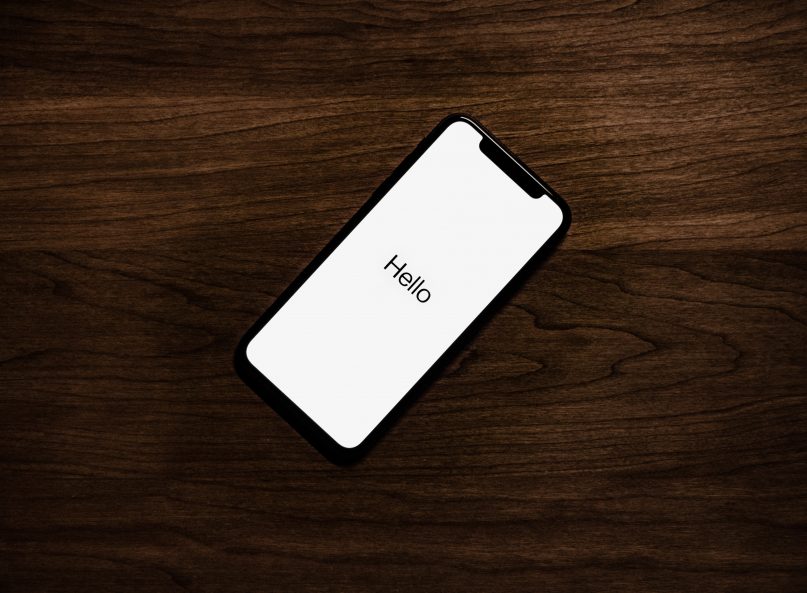The funniest thing that ever happened to me in my career happened in our synagogue library one Shabbat morning this past June.
I was teaching our Torah study class. We had been studying the prophets, and we came to a famous passage from the prophet, Micah.
“He has told you, O man, what is good, And what does the LORD require of you?….”
As I was reading that verse, someone in our study group accidentally pushed the button on his or her IPhone.
At the precise moment that I read: “…and what does the LORD require of you?” – Siri responded:
“I cannot give you an answer to that question!”
I am addicted to my IPhone. I could make any number of excuses – like, the fact that most of us are addicted to our smart phones, that it is a societal obsession.
We have come to view the release of a new IPhone or a new operating system in ways that our ancestors reserved for their hopes of the coming of the Messiah.
This new phone will solve all your problems – especially those problems that you did not even know that you had. This new phone will be even faster – because waiting that nano-second for that text message is a waste of my time.
I am not a Luddite. I am not suspicious of technology – though that technology poses huge, fundamental challenges to our way of thinking.
But, let us consider the hidden human and spiritual costs of technology.
How many times have you been in a restaurant – and you see a family at a table – and every single person in that family is on their phone?
Many of us in our society spend more time looking at a screen made of glass – than at a face made of flesh.
Because, when you have conversations on a screen, it is easy. Conversations on a screen don’t require any real emotional investment. The Emoji is convenient, but it is not a real emotion.
We might be connected. We might be accessible.
But, we are not present.
The stories that we tell about our ancestors – are about people who were radically present – for God, and for each other. That is actually the real origin of religion – radical amazement, as Abraham Joshua Heschel put it – the sheer act of paying attention – and letting God suffuse that moment of paying attention.
When Abraham took Isaac to the almost sacrifice, he did not tweet the experience — #takingmysontokillhimbutgodwillpreventit.
When Jacob saw the ladder of angels, he did not post it on Instagram.
When Moses encountered God at the burning bush, he did not “friend” God on Facebook – or, as it was known then, Face-scroll.
Why is it – that at every bar and bat mitzvah, and at every wedding, and at funerals, and at brises, I must ask people to turn off their mobile phones? Some people simply cannot do that, or will not do that. This is our addiction.
What I am trying to say to them, and to us: Be here. Be present for this moment. Don’t take selfies. Just remember the moment. Let your soul remember it. Let this moment echo the patriarchs and let this moment echo God and let this moment say to you: Hineini. I am here. The least you can do is be here, as well.
Let’s realize something about the toys in our hands.
They are smart phones.
They are not wise phones.
The poet, T.S. Eliot wrote: “Where is the life lost in living? Where is the wisdom lost in knowledge? Where is the knowledge lost in information?”
Judaism has something important to say to the world: knowledge is more important than information, and wisdom is more important than knowledge.
I tell parents: There are many places in this world where your child can get knowledge. There are many places in this world where your child can get skills. There are many places in this world where your child can have fun.
But, there is only one place in your child’s life where he or she can get the necessary wisdom for having a deep, powerful, significant life. That is here. That is what I teach our kids – how to be real; how to be significant; how to be a mensch.
Because what we have become good at doing, in America today, is accessing information.
Do you know what we have become bad at?
Thinking.
Have you noticed how many people in our society have simply abandoned thinking?
Do you know why?
It takes time.
If we reduce everything in our culture to the level of fast food, then we will have consented to living in a depraved culture. Some things should take time. Art takes time. Literature takes time. Wisdom takes time. Thinking takes time.
Enter the synagogue, and enter the Torah, and enter our prayers and our texts and our thoughts and our thinkers and our sages – and there you shall find wisdom. It will not be immediate. It will take time. Judaism takes time.
This is your homework for this year.
Be more present – for people in your life, and for God.
Concentrate more on wisdom than on information.
Here is the hard one – so hard, that I wonder if I can even do it.
Find one hour a day – one waking hour a day – when you will put your phone aside.
And finally: remember that there are some questions that Siri cannot answer.
(Adapted from my Rosh HaShanah evening sermon at Temple Solel, Hollywood, Florida)






